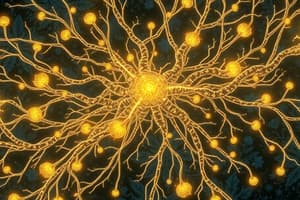Podcast
Questions and Answers
What is the primary function of coordination in the body?
What is the primary function of coordination in the body?
- To slow down the response of organs
- To enhance the independence of organ systems
- To maintain homeostasis through organ interactions (correct)
- To separate the functions of different organs
During physical exercise, which of the following functions increases to support increased muscular activity?
During physical exercise, which of the following functions increases to support increased muscular activity?
- Decreased heart rate
- Decreased oxygen supply
- Reduced blood flow to muscles
- Increased respiratory rate (correct)
Which parts comprise the central neural system (CNS)?
Which parts comprise the central neural system (CNS)?
- Brain and spinal cord (correct)
- Nerves and ganglia
- Afferent and efferent fibers
- Neurons and hormones
What type of nerve fibers transmit impulses from tissues to the CNS?
What type of nerve fibers transmit impulses from tissues to the CNS?
Which system complements the neural system in coordinating body functions?
Which system complements the neural system in coordinating body functions?
How is the neural system organized in lower invertebrates like Hydra?
How is the neural system organized in lower invertebrates like Hydra?
What is the main role of the efferent nerve fibers?
What is the main role of the efferent nerve fibers?
What distinguishes the human neural system from those of lower organisms?
What distinguishes the human neural system from those of lower organisms?
What is the primary function of the somatic neural system?
What is the primary function of the somatic neural system?
Which part of the neuron contains organelles and Nissl's granules?
Which part of the neuron contains organelles and Nissl's granules?
What are the gaps between two adjacent myelin sheaths called?
What are the gaps between two adjacent myelin sheaths called?
Which type of neuron has one axon and one dendrite?
Which type of neuron has one axon and one dendrite?
What is the role of neurotransmitters in the neuron?
What is the role of neurotransmitters in the neuron?
In which type of neurons are myelinated nerve fibers typically found?
In which type of neurons are myelinated nerve fibers typically found?
Which statement about unmyelinated nerve fibers is correct?
Which statement about unmyelinated nerve fibers is correct?
Which division of the PNS transmits impulses to involuntary organs?
Which division of the PNS transmits impulses to involuntary organs?
Flashcards
Homeostasis
Homeostasis
The process by which different organs work together to maintain a stable internal environment in the body.
Neuron
Neuron
A specialized cell responsible for receiving, transmitting, and processing information within the nervous system.
Brain
Brain
The central processing unit of the nervous system, responsible for complex functions like thinking, memory, and sensory processing.
Spinal Cord
Spinal Cord
Signup and view all the flashcards
Peripheral Nervous System (PNS)
Peripheral Nervous System (PNS)
Signup and view all the flashcards
Afferent Nerve Fibers
Afferent Nerve Fibers
Signup and view all the flashcards
Efferent Nerve Fibers
Efferent Nerve Fibers
Signup and view all the flashcards
Somatic Neural System
Somatic Neural System
Signup and view all the flashcards
Autonomic Neural System
Autonomic Neural System
Signup and view all the flashcards
Sympathetic Neural System
Sympathetic Neural System
Signup and view all the flashcards
Parasympathetic Neural System
Parasympathetic Neural System
Signup and view all the flashcards
Dendrites
Dendrites
Signup and view all the flashcards
Axon
Axon
Signup and view all the flashcards
Nodes of Ranvier
Nodes of Ranvier
Signup and view all the flashcards
Study Notes
Neural Control and Coordination
- Body organ systems must coordinate to maintain homeostasis. Organs interact and complement each other.
- Example: Physical exercise increases energy demand, oxygen supply, and thus respiration, heartbeat and blood flow rate. When exercise stops, these functions return to normal.
- Neural and endocrine systems coordinate bodily functions.
Neural System
- Highly specialized cells (neurons) detect, receive and transmit stimuli in all animals.
- Lower invertebrates have simple neural networks (e.g., Hydra).
- Insects have more complex systems with a brain and ganglia.
- Vertebrates have the most developed neural systems.
Human Neural System
- Divided into:
- Central Neural System (CNS): Brain and spinal cord, responsible for information processing and control.
- Peripheral Neural System (PNS): All nerves connecting to CNS.
- Nerve fibers are:
- Afferent: Transmit impulses from tissues/organs to the CNS.
- Efferent: Transmit impulses from the CNS to peripheral tissues/organs.
- Further divided into:
- Somatic Neural System: Relays impulses to skeletal muscles.
- Autonomic Neural System: Transmits impulses to involuntary organs and smooth muscles - further divided into sympathetic and parasympathetic systems.
- Visceral nervous system: Complex of nerves, fibers, ganglia, and plexuses connecting CNS to viscera.
- Nerve fibers are:
Neuron Structure and Function
- Neurons are composed of:
- Cell body: Contains cytoplasm and Nissl's granules.
- Dendrites: Branching fibers projecting from the cell body, transmitting impulses towards the cell body.
- Axon: Long fiber transmitting impulses away from the cell body. Axons branch into synaptic knobs, which contain neurotransmitters in vesicles.
Neuron Types
- Classified by the number of axons and dendrites:
- Multipolar: One axon, two or more dendrites (cerebral cortex).
- Bipolar: One axon, one dendrite (retina).
- Unipolar: One axon, one cell body (embryonic stage).
Axon Types
- Myelinated: Enveloped by Schwann cells forming a myelin sheath; gaps between myelin are nodes of Ranvier. Found in spinal and cranial nerves.
- Unmyelinated: Schwann cells do not form a myelin sheath; common in the autonomic and somatic neural systems.
Studying That Suits You
Use AI to generate personalized quizzes and flashcards to suit your learning preferences.





